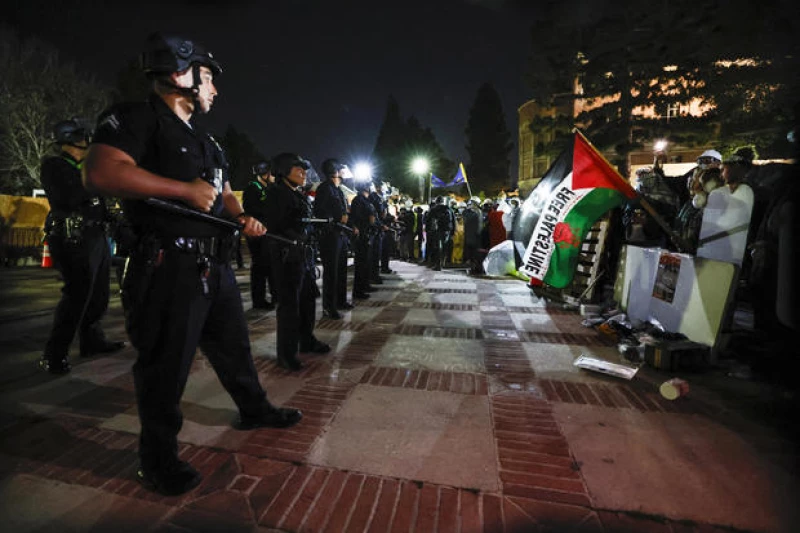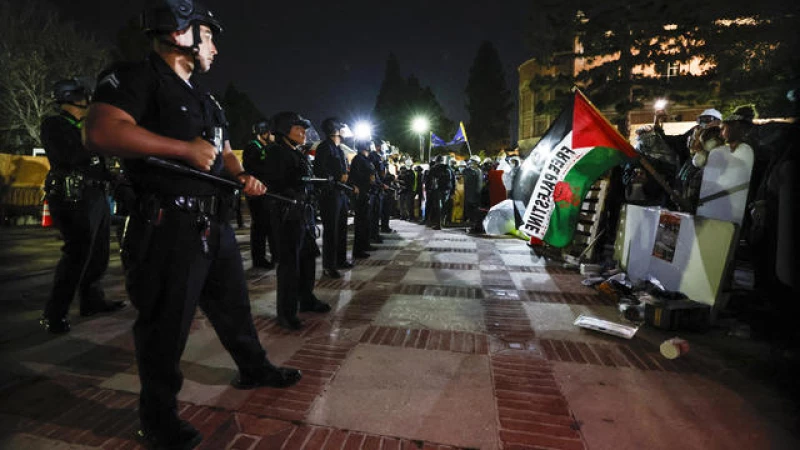Hundreds of pro-Palestinian protesters remained behind barricades on the UCLA campus early Thursday morning despite police orders to leave as officers were poised to move in on their fortified encampment that was ringed by an even larger crowd, including supporters who locked arms and curious onlookers.
Videos began emerging on social media overnight of police in the encampment:
Los Angeles City Controller Kenneth Mejia said on X that, "We are at UCLA. There is a large police presence from multiple law enforcement agencies after outside mobs attacked peaceful student protestors last night with no one protecting them. Students now face police. We urge UCLA & City leaders to protect students, not do more harm."

Huge numbers of police began arriving late in the afternoon Wednesday, and empty buses were parked near the University of California, Los Angeles to take away protesters who don't comply with the order. The tense standoff came one night after violence instigated by counter-protesters erupted in the same place.
Protests at UCLA Campus
Amidst the backdrop of a setting sun, a small city emerged within the barricaded encampment at UCLA, bustling with hundreds of people and tents set up on the campus quad. Some protesters engaged in Muslim prayers, while others defiantly chanted "we're not leaving" or distributed goggles and surgical masks. Clad in helmets and headscarves, they strategized on handling pepper spray and tear gas, all while a voice sang out over a megaphone.
Not far off, a group of individuals fashioned makeshift shields from plywood in preparation for potential clashes with police elsewhere on the campus. "Who needs a shield for rubber bullets?" one protester called out.
Simultaneously, a large gathering of students, alumni, and local residents congregated on the campus steps outside the encampment, seated as they listened to various speakers and joined in pro-Palestinian chants. Among them, a group of students displayed signs and wore T-shirts in solidarity with Israel and the Jewish community. The crowd swelled as the night progressed, with a growing number of officers arriving on campus.
The heightened law enforcement presence and repeated warnings starkly contrasted with the previous night's events, where counter-demonstrators attacked the pro-Palestinian encampment, hurling traffic cones, deploying pepper spray, and dismantling barriers. The skirmish lasted for hours until police intervention, with no arrests made. Despite at least 15 protesters sustaining injuries, the restrained response from authorities drew ire from political figures, Muslim students, and advocacy organizations.
Ray Wiliani, a local resident, voiced his support for the pro-Palestinian demonstrators, stating, "We need to take a stand for it. Enough is enough."
During a news conference at UCLA, Chancellor Gene Block expressed his dismay over the previous night's attack, referring to the perpetrators as "a group of instigators." However, he did not provide specific details about the crowd involved or why the administration and school police did not intervene sooner.
Block emphasized, "However one feels about the encampment, this attack on our students, faculty, and community members was utterly unacceptable. It has shaken our campus to its core."
In response to the incident, Block pledged to conduct a thorough review of the events that transpired that night, following criticism from California Governor Gavin Newsom regarding the delays in action.
The head of the University of California system, Michael Drake, took further steps by ordering an "independent review of the university's planning, its actions, and the response by law enforcement."
During a subsequent news conference on the Los Angeles campus, Rebecca Husaini, chief of staff for the Muslim Public Affairs Council, stressed the importance of the community feeling protected by the police rather than being put in harm's way. Muslim students present at the conference recounted the events of the previous night, disputing the university's report that only 15 people were injured and one was hospitalized. They claimed that the actual number of individuals taken to the hospital was higher. One student shared their experience of having to seek medical attention after being struck in the head by an object wielded by counter-protesters.
Students Unite in Protest Movement Against Israel
During a recent news conference, students shared their experiences of having to rely on each other for support rather than the police during attacks. Many participants in the pro-Palestinian encampment maintained a peaceful stance and avoided engaging with counter-protesters, leading to a cancellation of classes at UCLA.
The Bigger Picture
Across campuses in the United States, tent encampments have emerged as part of a student-led movement urging universities to sever ties with Israel and companies allegedly supporting the conflict in Gaza. The response from authorities, reminiscent of past crackdowns on Vietnam War protests, has resulted in at least 38 instances of arrests at campus demonstrations since April 18. Over 1,600 individuals have been arrested at 30 different schools.
While some universities have managed to reach agreements with protest leaders to minimize disruptions to campus operations and upcoming events like commencement ceremonies, others have faced escalating tensions. At Brown University, for instance, administrators have committed to considering a vote on divesting from Israel in response to student demands.
These developments are unfolding against the backdrop of a crucial election year in the U.S., prompting speculation about the support President Joe Biden will receive from young voters - a demographic that holds significant influence for the Democratic party - given his unwavering backing of Israel.
The nationwide campus demonstrations began at Columbia on April 17 to protest Israel's offensive in Gaza, which followed Hamas launching a deadly attack on southern Israel on Oct. 7. Militants killed about 1,200 people, most of them civilians, and took roughly 250 hostages. Vowing to stamp out Hamas, Israel has killed more than 34,000 Palestinians in the Gaza Strip, according to the Health Ministry there.
Israel and its supporters have branded the university protests antisemitic, while Israel's critics say it uses those allegations to silence opposition. Although some protesters have been caught on camera making antisemitic remarks or violent threats, organizers of the protests, some of whom are Jewish, say it is a peaceful movement aimed at defending Palestinian rights and protesting the war.
Other demonstrations
The chaotic scenes at UCLA came just hours after New York police burst into a building occupied by anti-war protesters at Columbia University on Tuesday night, breaking up a demonstration that had paralyzed the school.
Police in New Hampshire made arrests and took down tents at Dartmouth College and officers in Oregon came onto the campus at Portland State University as school officials sought to end the occupation of the library that started Monday.
In Madison, Wisconsin, a scrum broke out early Wednesday after police with shields removed all but one tent and shoved protesters. Four officers were injured, including a state trooper who was hit in the head with a skateboard, authorities said. Four were charged with battering law enforcement.
Police cleared protest encampments in various locations across the U.S., leading to arrests, while others were voluntarily closed at educational institutions such as The City College of New York, Fordham University in New York, Portland State in Oregon, Northern Arizona University in Flagstaff, Arizona, and Tulane University in New Orleans.







